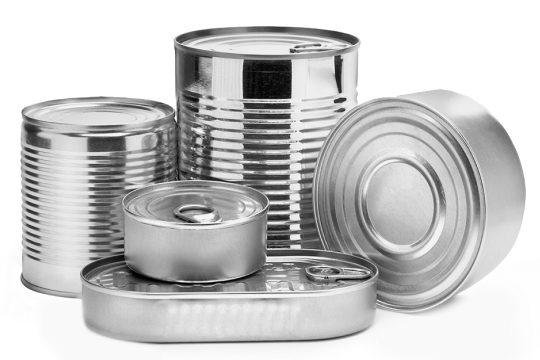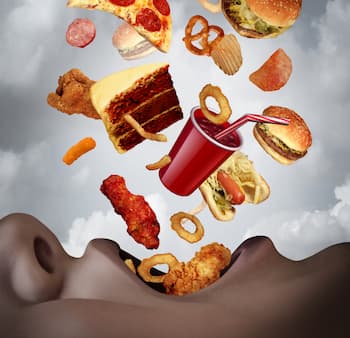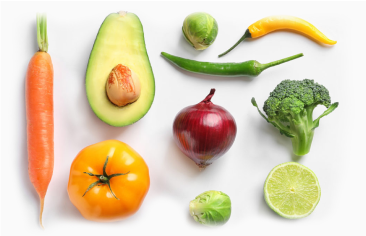The Importance of Fresh Foods Vs. Canned and Frozen Food
Open your pantry, and dig all the way to the back shelf. If you are anything like most people, there are likely cans back there that have been there for five years or more. You check the expiration date, check the can for any damages or bumps, and you find that these cans still look “good”. But, considering that all organic elements break down over time, are these foods really as healthy as their fresh counterparts?
The answer is a resounding “NO!”. Canned, frozen, freeze-dried, and otherwise preserved foods often have a much different nutritional profile compared to their fresh counterparts. This happens for a variety of reasons, which we will discuss in detail in this article. Further, we will take a look at why fresh, whole foods are your best bet for obtaining optimal nutrition. But first, let’s take a look at why processed foods last so much longer than fresh foods.

How Foods are Canned and Frozen
If you have ever canned vegetables at home (the process of preserving them), you may think that all canning is simply the process of heating the food up slightly and creating an airtight seal. This works well with mason jars because glass is non-reactive and does not interact with the food inside. However, commercial canning processes typically use metal cans made of tin or aluminum. These cans require a special lining. More than this, companies may add other preservatives, salts, vinegar, and synthetic chemicals to make the food appear fresh and appealing.
Companies add these chemicals because metals are much more reactive than glass. In fact, most cans must have a plastic lining on the inside to protect the metal from corrosion. Foods like tomatoes, which are naturally acidic, will eat right through the metal over time. Unfortunately for consumers, the plastic lining in cans contains chemicals like BPA, which has been shown to cause cancer. BPA also acts like a hormone within your body, disrupting your natural endocrine signals. Further, BPA is only one of many chemicals used to commercially can foods. Specifically, BPA is found in 73% of canned foods.
Unfortunately, frozen foods aren’t always any better for you than canned. Like canned foods, frozen foods also regularly have chemicals added to keep the food looking fresh and edible. Further, the process of freezing damages the nutritional content of foods. One study has shown that the antioxidant activity of vegetables is
decreased by 50% when foods are frozen. This means that frozen food may only have half of the active nutrients found in fresh foods.
Freeze-dried food is usually full of chemicals to make it look better. While canned and frozen foods preserve some nutrients and taste, freeze-dried food does not look, feel or taste anything like fresh produce.
What about Restaurant Food?
Well, it largely depends on the restaurant. Large chain restaurants typically use a high amount of canned, frozen, or otherwise processed foods. Like the typical consumer, they do this out of convenience and as a way to reduce their labour costs. It only takes seconds to open a large can of tomatoes, but would take an hour for an employee to cut up fresh tomatoes for lots of customers. Further, restaurants often use far too much oil in their foods.
This added fat can be detrimental to your health, especially if they’re cheaper “bad” fats. Not only are added fats bad for you, but restaurants often let their large batches of oil oxidize. This is a chemical reaction within the oils that causes the formation of unhealthy compounds. In fact, researchers have said that the consumption of oxidized fats within a diet poses a “chronic threat to human health”. By cooking at home, you can cook with no added fats, sugar, or unnecessary preservatives! If you have to eat out, pick a locally-owned restaurant which sources all of their ingredients fresh.
But, Processed Foods are Convenient!

It’s hard to argue this point. Many people like the convenience of grabbing a can of beans, a frozen meal, or a whole week’s worth of Hot Pockets. It’s quick, easy, and allows for a meal to be assembled in minutes. But, is it worth your health?
Consider this: you are what you eat. Your body is constantly losing cells and building new cells to replace those that are lost. In fact, your skin completely replaces itself every 47 days. This means that the nutrients you take in over the course of a month will be used as the basis for rebuilding your entire body. With this in mind, buying fresh, whole foods should be a top priority for everyone. Fresh foods have the highest nutritional value, the highest antioxidant activity, and contain many more biologically active molecules compared to processed, canned, and frozen foods.
By way of analogy, the situation is similar to not wearing a seatbelt. You know that your seatbelt could save your life. The only reason not to wear it would be convenience. However, it only takes a second to buckle-up. This tiny action can end up saving your life. Likewise, the extra time shopping for and preparing whole foods can mean the difference between life and death. While it won’t be as dramatic as a car crash, the extra chemicals and lower nutritional value of processed foods can lead to cancers, heart disease, circulatory system disorders, and a wide range of neurological conditions.

Chefs Plate: Try Chef's Plate Meal Kits From $2.99 Per Serving!
Apply discount

HelloFresh: Get Up to $200 Off + Free Breakfast for Life
Apply discount
How to Buy and Eat Fresh, Whole Foods
We understand how difficult it is to transfer to a diet of fresh foods if you’re new to it — we hear it from our customers all the time. Not only do you have to buy the food, but you have to cook it or prepare it as well. This process does take time and energy, but there are several things you can do to shorten the process and make it enjoyable. Here are some tips for buying and cooking fresh, whole foods.
Use a Food Subscription Service or Grocery Service
While this may sound expensive, many grocers are developing “curbside pickup” programs. This allows you to shop from the comfort of your home, and the pickup process only takes a few minutes to load the groceries into your car and pay for them.
Other services, such as GoodFood and HelloFresh, will deliver pre-portioned ingredients for meals right to your door. These meals or food subscription boxes typically contain all fresh ingredients. Also, they are great for people with little to no cooking experience. The instructions are clear, and you will get only the ingredients you need, so no food waste.
Get a Better Knife
Nothing is more frustrating than cooking with a dull knife. A dull knife mushes tomatoes and soft foods, tires out your hand, and is just generally hard to use. A sharp knife slides through the toughest foods like butter and makes the process of preparing a meal faster, safer, and more efficient. You can either purchase a sharp knife, get a good sharpener, or both! While this may seem like an unnecessary step, trust us, it is worth it. And if you’re someone who would rather not use a sharp knife for food prep, some meal kit companies take care of this for you and cut everything you need!
Buy an Instant Pot
An Instant Pot is a type of modern pressure cooker. Pressure cooking traps the steam being released from a boiling pot. If you know anything about physics, raising the pressure also raises the temperature. Using a pressure cooker, your food will cook faster, at a much higher temperature. Things like dry beans, which typically take 8 hours to soak and 4 more to cook, take only 45 minutes in a pressure cooker. Mashed potatoes can be made in minutes, not hours. Further, modern Instant Pots have a variety of functions to create soups, saute foods, and even make a perfect batch of rice.
Learn about Plant-based, Whole-food Diets
While some people think that the plant-based, whole-foods diet is just another fad diet, we think it is here to stay. Epidemiologists have shown that the Western diet is unusually high in fats, protein, and animal products in general. This increase in animal products is directly related to an increase in coronary artery disease, cancer, and many other degenerative conditions. In fact, one of those researchers has even created a free website, to teach people great recipes that rely on fresh, whole foods. You can also find vegan meal kits now.
Just Try It!
One of the main reasons that most people do not buy fresh foods is simply for convenience. And, we won’t lie, the first few weeks will be the hardest part of switching over or getting used to cooking again or for the first time. You will have to find new recipes, learn new cooking techniques, and do much more meal planning than you normally would. However, after only a few weeks on a fresh diet, you will feel better, cook better, and may find that you enjoy the process of cooking meals.
In fact, cooking a meal is mostly physical. You chop veggies, mix a salad, and stir a bowl of soup. But after a few times of repeating these actions, your brain can start to wander away from your cooking. People think of the time spent cooking as a waste, but in reality, it can be an excellent way to unwind, focus on your thoughts, and reduce your stress levels. Between that and the healthy food you are now eating, you are sure to feel better in no time!
Frequently Asked Questions:
Why is fresh food better than frozen?
Fresh food is better than frozen because it’s the best you can get. Not only does it taste better but it has more vitamins and minerals since freezing food reduces nutrients.
Is canned food healthy or not?
While canned food may contain healthy ingredients, companies often add preservatives, salts, vinegar, and synthetic chemicals to make the food appear fresh and appealing. What’s more, the cans have to have a special plastic lining to stop the food from reacting with the tin or aluminum.
Is frozen or canned better?
If you’re talking about fruit and veg alone, frozen is usually better. Canned food often has added sugars or preservatives to keep the food

Chefs Plate: Try Chef's Plate Meal Kits From $2.99 Per Serving!
Apply discount

HelloFresh: Get Up to $200 Off + Free Breakfast for Life
Apply discount




 Chefs Plate: Try Chef's Plate Meal Kits From $2.99 Per Serving!
Chefs Plate: Try Chef's Plate Meal Kits From $2.99 Per Serving! HelloFresh: Get Up to $200 Off + Free Breakfast for Life
HelloFresh: Get Up to $200 Off + Free Breakfast for Life